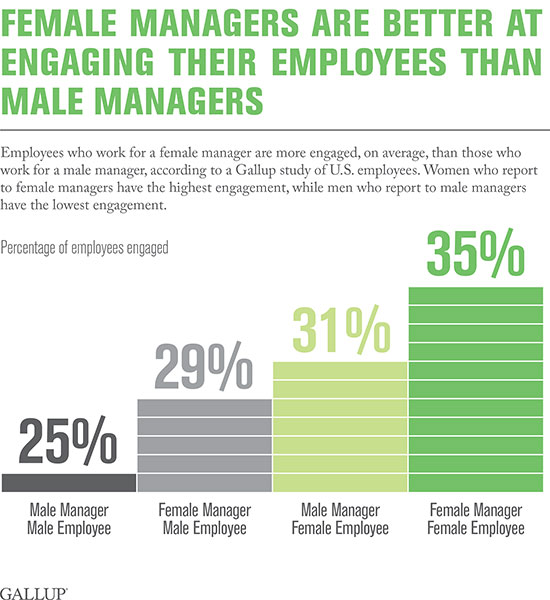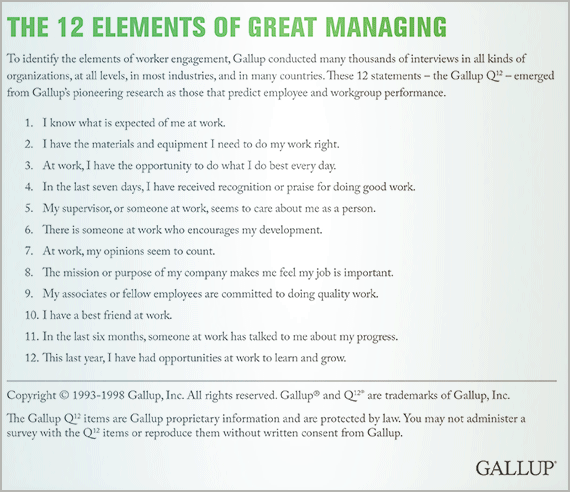Story Highlights
- Only one in three working Americans say they have a female boss
- Female managers are more engaged than their male counterparts
- Companies should hire and promote more female managers
When it comes to the topic of women in management, times have changed -- and so have attitudes.
In 1953, Gallup first asked Americans, "If you were taking a new job and had your choice of a boss, would you prefer to work for a man or a woman?" At that time, two-thirds of Americans said they preferred a male boss. Five percent said they preferred a female boss, and 25% volunteered that it made no difference to them.
Fast forward a little more than six decades later, and the contrasts are striking: Gallup asked Americans the same question and found that now one-third would prefer a male boss while 20% would prefer a female boss, and 46% say it doesn't make a difference to them. Though women are more likely than men to say they would prefer a female boss, they're still more likely to say they would prefer a male boss overall.
Amid these evolving sentiments, Gallup reports in State of the American Manager: Analytics and Advice for Leaders that employees who work for a female manager in the U.S. are actually more engaged, on average, than those who work for a male manager. However, only one in three (33%) working Americans say they currently have a female boss.
Though there are many highly successful female and male managers, female managers do have a slight advantage when it comes to engagement. And it's an advantage leaders should consider when deciding whom to name manager.
Leaders should also know that female managers themselves tend to be more engaged than male managers. Gallup finds that 41% of female managers are engaged at work, compared with 35% of male managers. In fact, female managers of every working-age generation are more engaged than their male counterparts, regardless of whether they have children in their household. These findings have profound implications for the workplace. If female managers, on average, are more engaged than male managers, it stands to reason that they are likely to contribute more to their organization's current and future success.
Higher Levels of Engagement Mean Higher-Performing Workgroups
Given that female managers are more engaged than male managers, their higher engagement levels likely result in more engaged, higher-performing workgroups. Gallup's data confirm this: Employees who work for a female manager are six percentage points more engaged, on average, than those who work for a male manager -- 33% to 27%, respectively. Female employees who work for a female manager are the most engaged, at 35%. Male employees who report to a male manager are the least engaged, at 25% -- a difference of 10 points.

Employees of Female Managers Outscore Employees of Male Managers on Most Engagement Items
In a survey of working Americans, Gallup found that employees who work for a female manager are 1.26 times more likely than employees who work for a male manager to strongly agree that "There is someone at work who encourages my development." This suggests that female managers likely surpass their male counterparts in cultivating potential in others and helping to define a bright future for their employees. It does not mean that female managers are more likely to promote their associates, but it could signify that women are more apt than men to find stimulating tasks to challenge their employees, thus ensuring associates develop within their current roles and beyond.

Female managers are not only more likely than male managers to encourage their subordinates' development, but they're also more inclined than their male counterparts to check in frequently on their employees' progress. Those who work for a female boss are 1.29 times more likely than those who work for a male boss to strongly agree with the Q12 item, "In the last six months, someone at work has talked to me about my progress." This suggests that female managers, more so than male managers, tend to provide regular feedback to help their employees achieve their development goals.
Those who work for a female manager are 1.17 times more likely than those with a male manager to strongly agree that "In the last seven days, I have received recognition or praise for doing good work." In addition to encouraging associate development through regular conversations about performance, this suggests that female managers surpass male managers in providing positive feedback that helps employees feel valued for their everyday contributions. It also indicates that female managers may be better than male managers at helping their employees harness the power of positive reinforcement.
Finally, employees who work for a female manager outscore those who work for a male manager on every Q12 element except one: "At work, my opinions seem to count." Overall, female managers eclipse their male counterparts at setting basic expectations for their employees, building relationships with their subordinates, encouraging a positive team environment and providing employees with opportunities to develop within their careers.
Organizations Should Hire and Promote More Female Managers
Female managers in the U.S. exceed male managers at meeting employees' essential workplace requirements. And female managers themselves are more engaged at work than their male counterparts.
While the explanation behind these findings is subject to debate, there are a few possible reasons as to why female managers and their employees are more engaged. Gallup's employee engagement data show that men and male managers are more likely to hold jobs that tend to be less engaging, such as production jobs. However, it is also likely that gender bias still pervades leadership and management in America. As such, female managers might be somewhat more adept and purposeful in using their natural talents to engage their teams because they need to exceed expectations to advance in their organization.
Though some may find Gallup's findings surprising, the management implication is quite clear: U.S. organizations should emphasize hiring and promoting more female managers. To do this, organizations should use talent as the basis for their selection decisions. Talent is an equalizer that removes gender bias in the hiring process. Talent gives organizations a proven, scientifically sound method for choosing the best candidate, regardless of gender.
